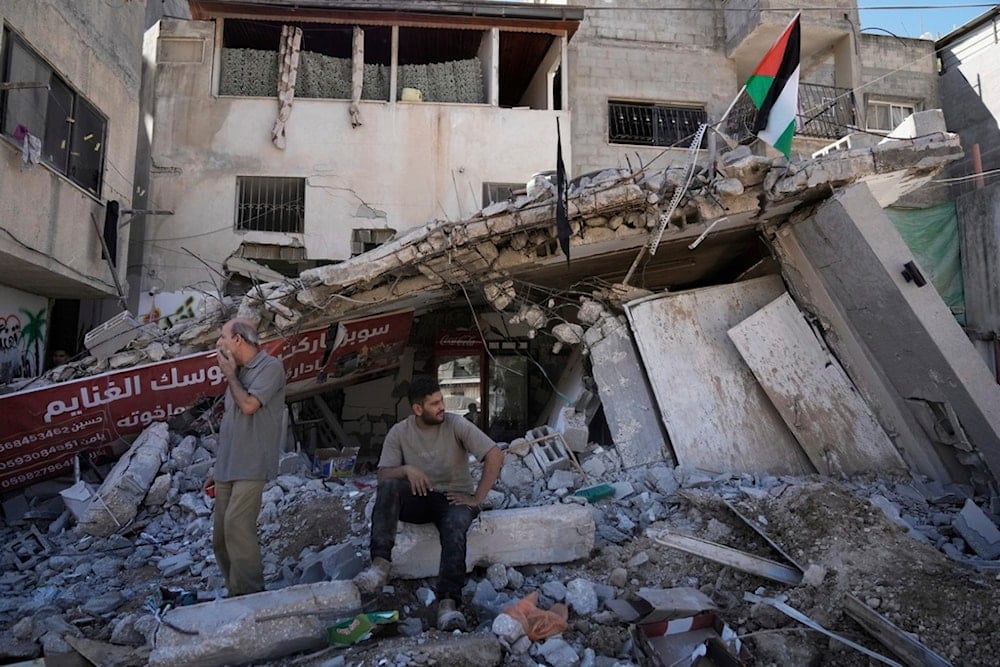UNCTAD report unveils devastating economic decline in Gaza, West Bank
Gaza's economy has shrunk to less than a sixth of its pre-war size, a UN report says.
-

People inspect the destruction following an Israeli forces raid in Tulkarem, West Bank, Palestine, September 11, 2024. (AP)
Since the start of the Israeli genocidal war on Palestine's Gaza Strip, the sector's economy has shrunk to less than one-sixth of its size. In parallel, the West Bank also faced "a rapid and alarming economic decline" since the beginning of "Israel's" expansion of its ethnic cleansing campaign across the occupied Palestinian territories where unemployment almost tripled.
These numbers were revealed by a United Nations Conference on Trade and Development (UNCTAD) report, which underscored the challenges of reconstruction and described Gaza's current economy as "in ruins".
"The Palestinian economy is in freefall," UNCTAD Deputy Secretary-General Pedro Manuel Moreno told reporters in Geneva, stressing that "the report calls for the international community to halt this economic freefall, address the humanitarian crisis, and lay the groundwork for lasting peace and development."
Moreno then emphasized the need for a comprehensive plan as the Palestinian Authority (PA) in the occupied West Bank remains under "immense pressure" that is jeopardizing its ability to function.
According to UNCTAD, more than 300,000 jobs have been lost in the West Bank since the war began, raising the unemployment rate from 12.9% to 32%.
The decline has been attributed to the Israeli aggression, which the UN says has resulted in the killing of more than 650 Palestinians with Israeli occupation fire since October 7. Additionally, since Operation Al-Aqsa Flood, the Israeli occupation has increased the number of checkpoints surrounding the occupied West Bank.
War on Gaza forces Israeli Finance Ministry to slash growth forecast
"Israel's" war on Gaza and the aggression on the West Bank have taken their on "Israel" as well.
Earlier this month, the Israeli Finance Ministry lowered its growth forecast for this year, highlighting the economic strain caused by the almost year-long war on Gaza.
According to new data on the Ministry's official website, the gross domestic product would expand by 1.1%, down from 1.9% previously. The estimate for 2025 has been reduced to 4.4% from 4.6%.
The latest prediction, based on "weaker-than-expected" statistics in the second quarter, suggests the occupation's economy would expand at its worst pace this year since about 2009, except for the Covid-19 epidemic in 2020.
The war on Gaza, in addition to the Israeli occupation's attempts at confronting the Lebanese Resistance Hezbollah in the north, has increased spending and Israeli economic imbalance. The Israeli economy has been severely harmed resulting in higher deficits, worse credit ratings, a damaged tourism sector, and continued public spending.
"Israel" was downgraded for the first time and local-currency bond rates have also increased sharply relative to US Treasuries, signaling investor concern.
Israeli authorities anticipate that the aggression would cost around $66 billion by the end of next year, accounting for more than 12% of GDP.
Fitch Ratings downgraded "Israel's" debt rating to A from A+ last month, stating that the war could extend into 2025 and the fiscal deficit might reach 7.8% of GDP this year, rising from 4.1% in 2023.
Last month, the Bank of Israel’s deputy governor, Andrew Abir, told Bloomberg that he doubted conditions would improve before the end of the year, expressing that “the surprise has been how long the war has been going on."
Read more: US approves $165mln in weapons sales to 'Israel': State Dept

 4 Min Read
4 Min Read








